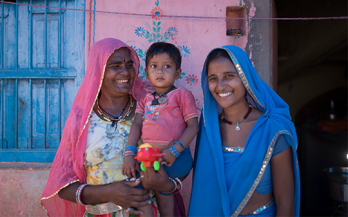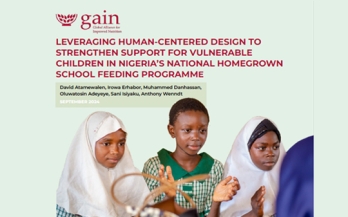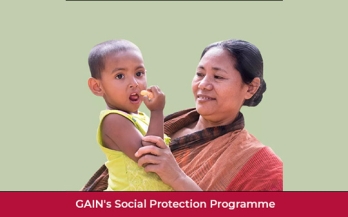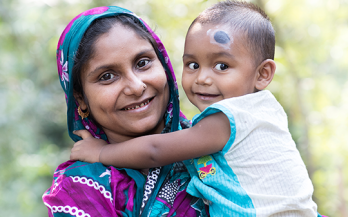

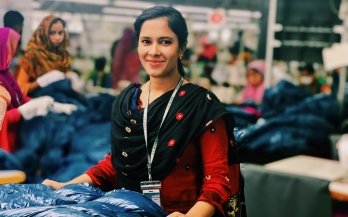
Fuelling the Workforce: How Nutrition Drives Occupational Health and Safety
This Human Rights Day, our panel will bring together experts from GAIN, SUN, ILO, and WHO to discuss the critical issue of nutrition integration in global labour standards. The panel is based on a comprehensive report that analysed the current state of nutrition considerations in international instruments, national legislation, and workplace practicesThis Human Rights Day, a live interview panel will bring together experts from GAIN, SUN, ILO, and WHO to discuss the critical issue of nutrition integration in global labour standards. The panel is based on a comprehensive report that analysed the current state of nutrition considerations in international instruments, national legislation, and workplace practices
GAIN Working Paper 44 - Nourishing the Workforce: Nutrition Integration in Occupational Safety and Health Regulations
This report presents objective findings on the current levels of nutrition integration in international instruments and guidelines, and national legislations, regulations and procedures. Nutrition is only integrated in a few examples. Many laws, instruments and codes were developed before worker malnutrition was as prominent an issue and before newer scientific evidence emerged linking worker performance to improved nutrition. This new context, married with the evidence in this report, highlights the enormous opportunity presented to future labour standard setting for employees and employers.World Food Day
This year's World Food Day theme, "Right to Food for a Better Life and Future", underscores the urgent need to address the global hunger crisis.
The most vulnerable populations, particularly women and children, bear the brunt of this crisis, highlighting the widening gap in food access and nutrition. GAIN's campaign, "Leaving No One Behind: Strengthening Social Protection for Lasting Improved Nutrition," aligns seamlessly with the World Food Day theme.
Social protection systems act as crucial safety nets, ensuring that vulnerable populations have access to healthy diets, even during times of shocks. Strengthening existing social protection systems, we can create more equitable food environments, thereby reducing disparities in food access and nutrition across different socioeconomic groups. This approach not only addresses the immediate needs of the hungry but also lays the groundwork for a more just and sustainable food system.

GAIN's Approach to Nutrition-Sensitive Social Protection
Through partnerships, policy advocacy, and programmes, GAIN works in seven countries to make social protection systems more nutrition-sensitive and better equipped to combat systemic and intergenerational inequities that limit the reach of vital services.
GAIN's social protection programme currently encompasses the following synergistic work areas:
Policy Advocacy. We provide technical advice to governments, engage in policy advocacy, and mobilise multilateral stakeholders to ensure that social protection policy environments are conducive to nutrition impact.
Value Chain Integration. We create and reinforce sustainable linkages between social protection systems and private-sector nutritious food value chains by scaling-up public procurement of nutritious foods, connecting small- and medium-enterprises (SMEs) to public procurement pipelines, and improving the nutritional value and regulatory compliance of nutritious foods destined for social protection systems.
![]() Social Protection Design. We develop and scale-up models of social protection that provide effective nutrition services for the most vulnerable households, with a particular focus on human-centered design (HCD) and social and behaviour change communication (SBCC).
Social Protection Design. We develop and scale-up models of social protection that provide effective nutrition services for the most vulnerable households, with a particular focus on human-centered design (HCD) and social and behaviour change communication (SBCC).
GAIN's work in these areas seeks to improve both the delivery and effective utilisation of nutrition services in social protection systems, ensuring that recipients attain the intended nutritional benefits. We believe that improving the delivery and utilisation of nutrition-sensitive social protection is key to achieving longer-term dietary resilience for the most vulnerable households.
Our social protection programme is rooted in four guiding principles: gender sensitivity, human centeredness, sustainability, and climate-awareness. These principles serve as lenses through which we view our work, and to which we hold ourselves accountable.
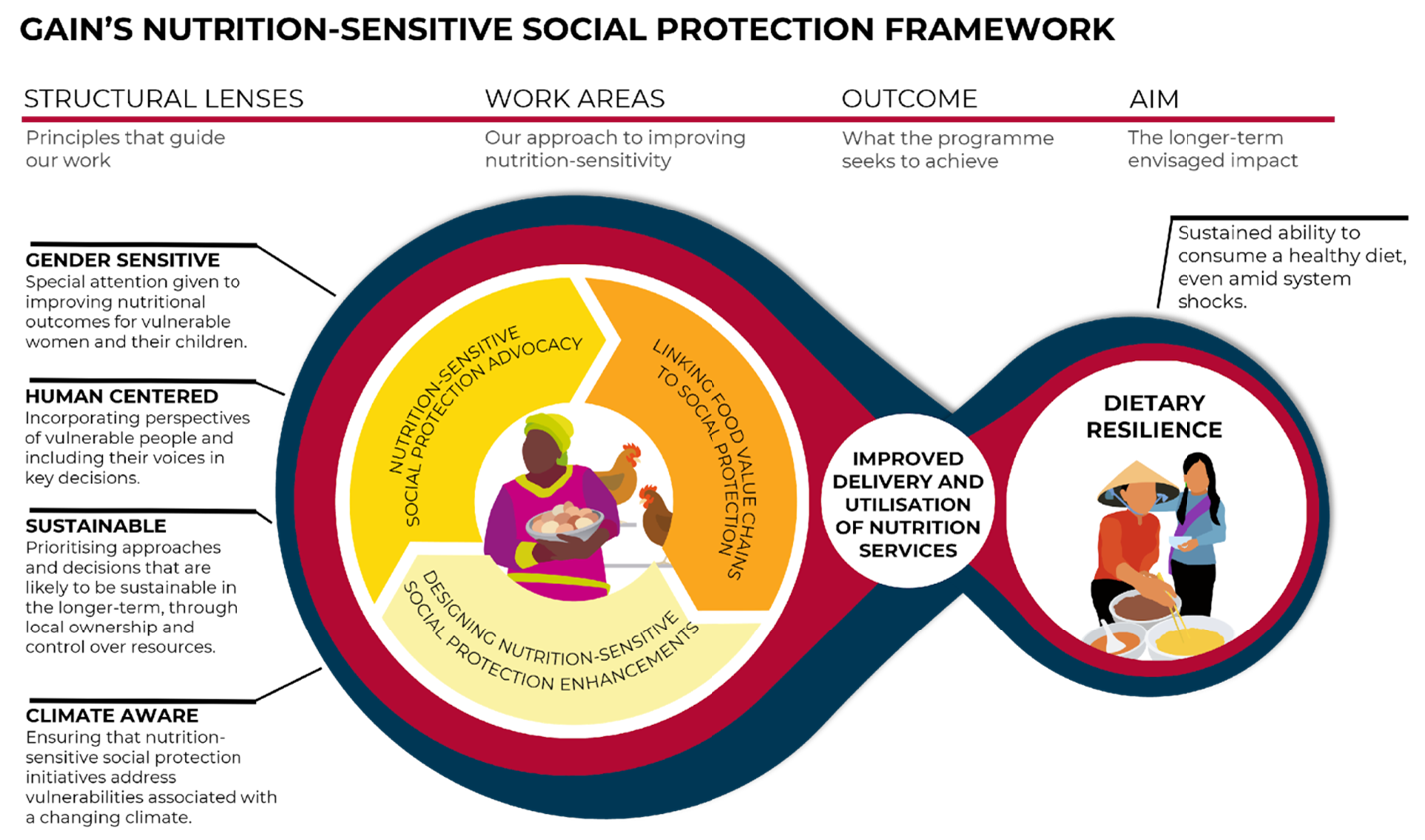
Ressources & assets
#WorldFoodDay: Social Protection at GAIN
Explore some of GAIN's past World Food Day Campaigns
World Food Day 2023 World Food Day 2021 World Food Day 2020
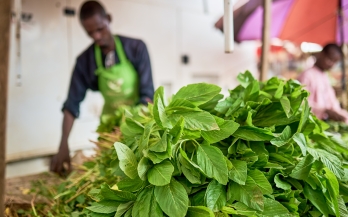
Transforming Food Systems for a climate-resilient, well-nourished Nigeria
Climate change is a threat to the sustainability of global and national food systems. Unsustainable food systems cannot ensure food and nutrition security or healthy eating patterns. Climate change is already altering agricultural production, food processing, distribution, and conSumption. Its impacts disrupt food supply, limiting people’s access to the diverse, safe, and nutritious foods that make up high-quality diets.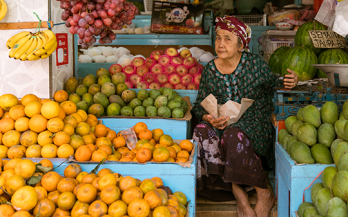
Leading the Change: GAIN at the Forefront of Indonesia's Green Economy Expo
GAIN Indonesia was at the forefront of Green Economy Expo held by The National Development Planning Agency (BAPPENAS) on July 3-5 in Jakarta. This year’s theme was “Advancing Technology, Innovation, and Circularity”. The event brought to the forefront discussions on sustainable development and the implementation of circular economy principles throughout Indonesia.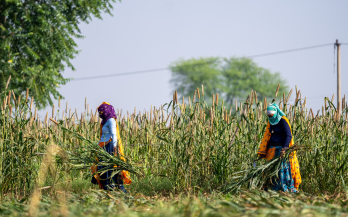
Navigating Climate Change: Impacts on Health and Nutrition
Environmental factors impact human health and nutrition through various pathways, and these impacts can be felt disproportionately by already vulnerable groups like women and children.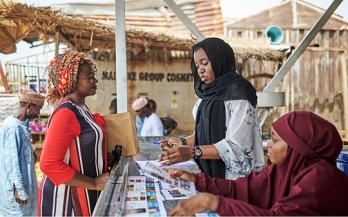
GAIN Working Paper Series 40: Bringing Food Safety to the Shoppers
Reducing foodborne disease in low- and middle-income countries (LMICs) is crucial for advancing nutrition, health, and other development goals. The U.S. Agency for International Development (USAID)/Feed the Future’s Evidence and Action Towards Safe, Nutritious Food (EatSafe) program sought to harness consumer demand as a mechanism to improve food safety practices and generate evidence on how to raise consumer demand for safe, nutritious foods in traditional market settings—the main source of food for most LMIC consumers.
Coordinating National And Sub-National Action For Food Systems Transformation
As countries develop their National Pathways for food systems transformation, one emerging need is to ensure policies land at different levels. A truly effective ‘national’ policy must span all sub-national areas.